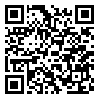Volume 5, Issue 1 (4-2019)
RSJ 2019, 5(1): 143-158 |
Back to browse issues page
Abstract: (282 Views)
Background & Objectives: The main goal of blood transfusion organizations is to maintain a stable supply of blood. Managers should use strategies such as marketing and donor behavior management to attract and retain donors. The aim of the research was to investigate the effect of goal-related marketing and personal norms on the intention to donate blood again in clients of Karaj Blood Transfusion Organization.
Materials & Methods: In terms of the logic of the research implementation, the current type of research is of a comparative type, in terms of the implementation process, it is of a quantitative type, and in terms of the purpose of the research, it is an analysis in the paradigm of positivism. Due to cross-sectional time, in terms of the method of data collection, it was a survey type, and in terms of the results and consequences of the research, it was of an applied type. The research tools include standard marketing questionnaires related to the goal of Lee et al. (2021), personal norms by Wang et al. (2018), the intention to donate blood again by Boenik and Saltzman (2018) during a simple random sampling of the data of 391 donors using descriptive statistics. And the regression tests were analyzed by structural equation modeling.
Results: Validity, reliability and quality indicators of the model were acceptable. Target-related marketing (T=4.501, Beta=0.182) and personal norm (T=12.916, Beta=0.487) had a significant effect on the intention to donate blood again.
Conclusion: According to the findings of the research, it is expected that the intention to donate blood will increase as a result of marketing related to the goal and personal norms of the donor. Therefore, by investing in target-related marketing and strengthening the personal norms of donors, the blood transfusion organization can expect to increase the intention to donate blood again.
Results: Validity, reliability and quality indicators of the model were acceptable. Target-related marketing (T=4.501, Beta=0.182) and personal norm (T=12.916, Beta=0.487) had a significant effect on the intention to donate blood again.
Conclusion: According to the findings of the research, it is expected that the intention to donate blood will increase as a result of marketing related to the goal and personal norms of the donor. Therefore, by investing in target-related marketing and strengthening the personal norms of donors, the blood transfusion organization can expect to increase the intention to donate blood again.
Article number: 11
Type of Study: Research |
Subject:
Special
Received: 2024/01/14 | Accepted: 2024/03/12 | Published: 2024/03/17
Received: 2024/01/14 | Accepted: 2024/03/12 | Published: 2024/03/17
| Rights and permissions | |
 |
This work is licensed under a Creative Commons Attribution-NonCommercial 4.0 International License. |



